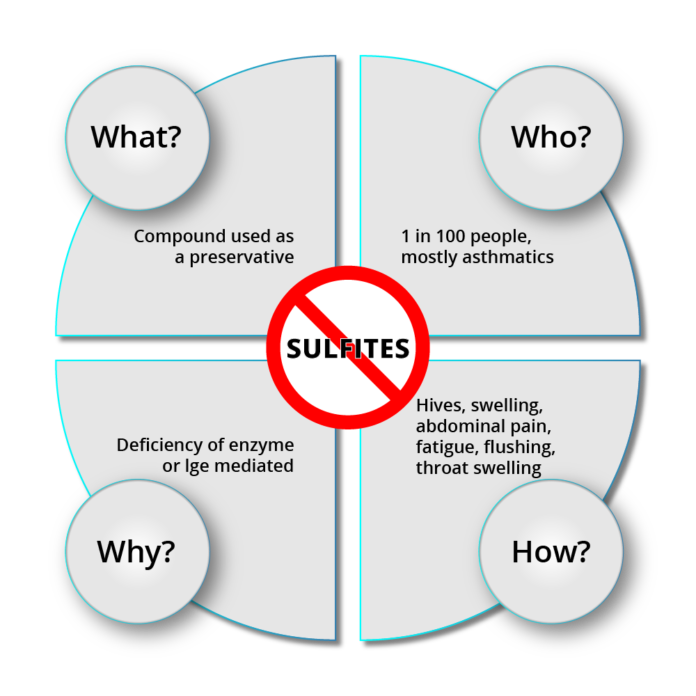What are sulfites and how can they effect you? In this article we’ll cover everything you need to know about the health impacts and dangers of sulfites and sulfates.
What are sulfites?
Sulfites (aka sulphites) are a salt compound that occur naturally in our bodies and can be added to many foods, beverages and toiletries. Essentially, sulfites help foods maintain their freshness such as being used to bleach potatoes, maintain freshness of dried foods, prevent growth of microorganisms such as in drinking water pipes, preserve color such as in lemon juice concentrate, condition pizza dough and pie, inhibit the growth of bacteria in wine during fermentation, prevent browning of seafood, bleaching of foods such as maraschino cherries. Medications can also contain sulfites and sulfates to maintain the effectiveness. Sulfites and sulfates can also be found in many face products, toothpaste, shampoos, soaps, lotions and make up.
Who can they impact?
The FDA estimates that 1 in 100 people are sensitive to sulfites, which means over 3 million people may be suffering in the United States. Sulfites are also counted in the world’s top nine allergens. Reactions to sulfites can vary, as the reactions are usually classified as sensitivities rather than a true allergy. People with asthma are at higher risk for a sulfite sensitivity with symptoms that mimic an asthma attack but can also include a rash, throat swelling and wheezing. Fun fact – the most common inhaler used to treat asthma – Albuterol inhaler is actually Albuterol Sulfate so imagine trying to treat your asthma with a substance you are actually allergic or sensitive to. You would expect symptoms to get worse, right? However, how would one easily isolate it to the salt in their inhaler?
Why is this important?
Reactions to sulfites in sulfite sensitive people can vary drastically because there are 3 main causes for sensitivity:
- Inhalation: SO2 may cause reflex contraction of the airways. (Example: quick onset of symptoms when drinking liquids like beer or wine or eating foods with sulfites, when SO2 is inhaled during the swallowing).
- Deficiency: partial deficiency of the enzyme sulfite oxidase which helps break down sulphur oxidase
- IgE-mediated allergy: mechanism for thos who have positive skin test reactions
How do I know if I am affected by sulfites?
My main reactions include flaring up of my Idiopathic Angioedema and abdominal pain. Other reactions can include rashes such as hives, flushing, racing heart, low blood pressure, chronic fatigue, itching, gastroparesis, gastritis and duodenitis. Unlike anaphylactic allergies, sensitivity to foods can be hard to diagnose because it may be dose based. Meaning a small amount – no problem. Increasing exposure over time or large amount at one time – problem. Because inhalation of a sulfite compound can trigger a reaction, if I get lucky (and I’m paying attention) if a food or drink has enough sulfites it in it, my nose will itch and I know to stop eating or drinking it. In fact, my nose would always start itching while having cocktails. I thought it was a reaction I might have to alcohol. Turns out it was the sulfites in the cocktails not the alcohol itself.
Are you impacted by sulfites? I would love to hear from you. Please share your story and let’s start a dialogue, or email me directly at [email protected]





[…] healthy. Avoid food triggers that may make you feel bad. For some like me, I still need to avoid sulfites, even though this does make grocery shopping more challenging than it already is. For Diabetics, it […]
[…] in a month is nothing compared to every day. My saving grace was finding that I was sensitive to sulfites. As soon as I started to limit sulfites in my diet, I realized I wasn’t lazy. I wouldn’t always […]
[…] do I begin in terms of when my symptoms started, and how I found out that all along it was sulfites causing me […]
[…] Sulfite sensitivity can affect 1 in 100 people. If over 100 million people have been vaccinated in America, then potentially 1 million of those people may suffer from sulfite reactions IF the vaccines had sulfites as included ingredients. […]
[…] our food chain. Found naturally in some foods and added to others, it can be difficult to avoid. Sulfite reactions can occur in 1 in 100 people. This can include up to 10% of […]
Comments are closed.